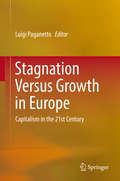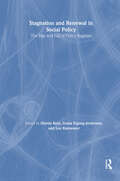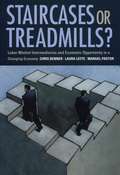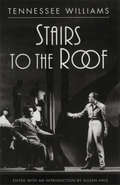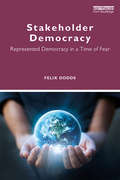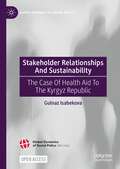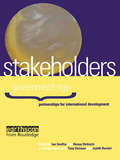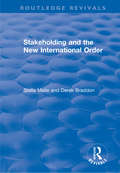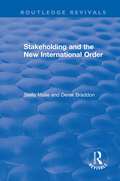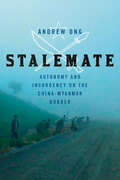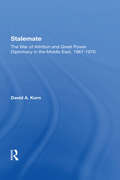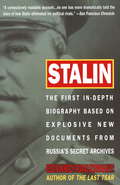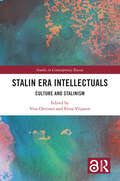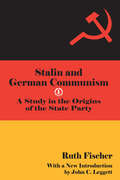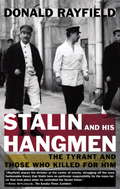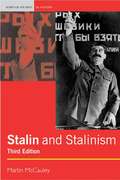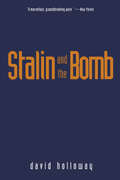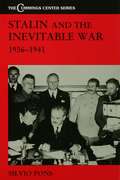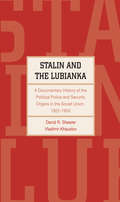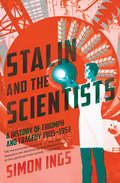- Table View
- List View
Stagnation Versus Growth in Europe
by Luigi PaganettoThis book explores the debate on the policies required to overcome the crises of 2008 and 2011, in which the focus on short-term measures has overshadowed the need to analyze the low growth rate in the European Union, and especially the Eurozone, as the basis for interventions that will counteract the tendency toward stagnation. Factors that lie at the root of the low growth are examined in depth, covering, for example, the impact of the demographic trend toward an aging population in Europe, consequences of inequality for growth, challenges posed by technological change, competition from emerging countries, and difficulties in improving European governance. In addition, potential actions to foster innovation and avoid long-term stagnation, such as new measures to open up markets, stimulate competition in services, and promote green growth, are discussed. The book comprises a selection of contributions presented at the XXVII Villa Mondragone International Economic Seminar, which brought together renowned economists and representatives of a broad range of countries and leading international institutions. It will appeal to all who are interested in the latest thinking on stagnation/growth, inequality, governance, competitiveness, and innovation in Europe.
Stagnation and Renewal in Social Policy
by Gosta Esping-AndersenThese essays analyze the ideological and historical sources of the apparent reversal of the pattern of welfare state expansion in the United States, Great Britain, and Western and Eastern Europe.
Stains on My Name, War in My Veins: Guyana and the Politics of Cultural Struggle
by Brackette F. WilliamsBurdened with a heritage of both Spanish and British colonization and imperialism, Guyana is today caught between its colonial past, its efforts to achieve the consciousness of nationhood, and the need of its diverse subgroups to maintain their own identity. Stains on My Name, War in My Veins chronicles the complex struggles of the citizens of Guyana to form a unified national culture against the pulls of ethnic, religious, and class identities. Drawing on oral histories and a close study of daily life in rural Guyana, Brackette E. Williams examines how and why individuals and groups in their quest for recognition as a "nation" reproduce ethnic chauvinism, racial stereotyping, and religious bigotry. By placing her ethnographic study in a broader historical context, the author develops a theoretical understanding of the relations among various dimensions of personal identity in the process of nation building.
Staircases or Treadmills?: Labor Market Intermediaries and Economic Opportunity in a Changing Economy
by Chris Benner Manuel Pastor Laura LeeteGlobalization, technological change, and deregulation have made the American marketplace increasingly competitive in recent decades, but for many workers this “new economy” has entailed heightened job insecurity, lower wages, and scarcer benefits. As the job market has grown more volatile, a variety of labor market intermediaries—organizations that help job seekers find employment—have sprung up, from private temporary agencies to government “One-Stop Career Centers.” In Staircases or Treadmills? Chris Benner, Laura Leete, and Manuel Pastor investigate what approaches are most effective in helping workers to secure jobs with decent wages and benefits, and they provide specific policy recommendations for how job-matching organizations can better serve disadvantaged workers. Staircases or Treadmills? is the first comprehensive study documenting the prevalence of all types of labor market intermediaries and investigating how these intermediaries affect workers’ employment opportunities. Benner, Leete, and Pastor draw on years of research in two distinct regional labor markets—“old economy” Milwaukee and “new economy” Silicon Valley—including a first-of-its-kind random survey of the prevalence and impacts of intermediaries, and a wide range of interviews with intermediary agencies’ staff and clients. One of the main obstacles that disadvantaged workers face is that social networks of families and friends are less effective in connecting job-seekers to stable, quality employment. Intermediaries often serve as a substitute method for finding a job. Which substitute is chosen, however, matters: The authors find that the most effective organizations—including many unions, community colleges, and local non-profits—actively foster contacts between workers and employers, tend to make long-term investments in training for career development, and seek to transform as well as satisfy market demands. But without effective social networks to help workers locate the best intermediaries, most rely on private temporary agencies and other organizations that offer fewer services and, statistical analysis shows, often channel their participants into jobs with low wages and few benefits. Staircases or Treadmills? suggests that, to become more effective, intermediary organizations of all types need to focus more on training workers, teaching networking skills, and fostering contact between workers and employers in the same industries. A generation ago, rising living standards were broadly distributed and coupled with relatively secure employment. Today, many Americans fear that heightened job insecurity is overshadowing the benefits of dynamic economic growth. Staircases or Treadmills? is a stimulating guide to how private and public job-matching institutions can empower disadvantaged workers to share in economic progress.
Stairs to the Roof
by Tennessee Williams Allean HaleA play produced only twice in the 1940s and now published for the first time reveals that Tennessee Williams anticipated the themes of Star Trek by decades. Sixty years ago a young Tennessee Williams wrote a play looking toward the year 2001. Stairs to the Roof is a rare and different Williams' work: a love story, a comedy, an experiment in meta-theater, with a touch of early science fiction. Tennessee Williams called Stairs to the Roof "a prayer for the wild of heart who are kept in cages" and dedicated it to "all the little wage earners of the world." It reflects the would-be poet's "season in hell" during the Depression when he had to quit college to type orders eight hours a day at the International Shoe Factory in St. Louis. Stairs is Williams' revenge, expressed through his alter ego, Benjamin Murphy, the clerk who stages a one-man rebellion against the clock, the monotony of his eight-to-five job, and all the dehumanizing forces of an increasingly mechanized and commercial society. Ben's swift-moving series of fantastic adventures culminate in an escape from the ordinary that is an endorsement of the American dream. In 1941 with the world at war and civilization in danger of collapse, Williams dared to imagine a utopian future as Ben leads us up his stairs towards the Millennium. Stairs to the Roof was produced only twice, once at the Playbox in Pasadena, California, in 1945, and subsequently at the Pasadena Playhouse in 1947. Now, in an edition meticulously prepared by noted Williams scholar Allean Hale, Williams fans can share this play of youthful optimism.
Stakeholder Democracy: Represented Democracy in a Time of Fear
by Felix DoddsIn the context of sustainable development, this book describes how we are moving from representative to participatory democracy, and how we are now in a "stakeholder democracy," which is working to strengthen represented democracy in a time of fear. Since the 1992 Rio Earth Summit the idea of stakeholder democracy has grown, with stakeholders engaged in helping governments and intergovernmental bodies make better decisions, and in helping them to deliver those decisions in partnerships amongst various stakeholders, with and without government. Seen through a multi-stakeholder, sector and level lens, this book describes the history of the development of stakeholder democracy, particularly in the area of sustainable development. The authors draw on more than twenty-five years of experience to review, learn from and make recommendations on how best to engage stakeholders in policy development. The book illustrates successful practical examples of multi-stakeholder partnerships (MSPs) to implement agreements and outline elements of an MSP Charter. This will provide a benchmark for partnerships, enabling those being developed to understand what the necessary quality standards are and to understand what is expected in terms of transparency, accountability, financial reporting, impact and governance. The book is essential reading for professionals and trainees engaging in multi-stakeholder processes for policy development and to implement agreements. It will also be useful for students of sustainable development, politics and international relations.
Stakeholder Relationships And Sustainability: The Case Of Health Aid To The Kyrgyz Republic (Global Dynamics of Social Policy)
by Gulnaz IsabekovaThis open-access book analyses how stakeholder relationships impact the sustainability of health aid. It does this by providing an overarching analytical framework, which allows for a systematic analysis of sustainability, relationships, and a possible causal link between these phenomena. The book goes beyond universal paradigms and detailed single-case studies by offering a thorough analysis of development projects to identify the factors that are also applicable to similar initiatives in comparable contexts.Empirically, it focuses on two health initiatives, both implemented in the Kyrgyz Republic, a country pursuing a sector-wide approach to health aid. Unique primary material provides insights into a geographic region that is mostly neglected, and will be of interest to students and researchers of social policy, development studies, international health and those focusing on the post-Soviet region and Central Asia.
Stakeholders of Terrorism and the Caribbean: A Short Case Study
by Emanuel QuashieThe book ambitiously seeks to shape our understanding of terrorism by offering a more systematic interpretation of terrorism-activism through the Stakeholders of Terrorism concept. The author presents an original assessment of terrorism broadly and specifically within the context of the Caribbean through the Stakeholders of Terrorism concept with a view to help the region enhance its counterterrorism policies (nationally & regionally) that recognises the complex inherent duality. In doing so, the author first borrows from and adds to the prevailing literature as it relates to the various explanatory frameworks (psychology, religion, strategy, culture/civilization context, politics and economic dimensions) and the specific stakeholders of terrorism (U.S. mainstream media, ISIS and Individual actors/lone wolf). The Stakeholders of Terrorism concept argues more broadly the existence of an inherent duality, a multiplicity of intangible and tangible negatives and positives that are simultaneously present in most situations concerning terrorism-activism.
Stakeholders: Government-NGO Partnerships for International Development
by Ian SmillieThis unique study from the OECD Development Centre presents a comprehensive review by independent experts of the relationships and division of responsibility between the 22 member governments of the OECD Development Assistance Committee (DAC), and NGOs from these donor countries, working in international development. Additional chapters cover the roles of the European Union and the World Bank. Among other themes, the book looks at two very significant issues. First, at the way in which an overemphasis on evaluation may be leading NGOs to focus purely on measuring their output, thus choosing activities which are easily accountable. Second, it examines the important impacts of the evolution in the funding relationship between governments and NGOs - from matching grants to contracts - where NGOs must increasingly compete for contracts.
Stakeholding and the New International Order
by Stella Maile Derek BraddonTitle first published in 2003. This invaluable book provides the first definitive critical introduction to the concept of stakeholding and its implications for policy and practice of key players in the new global order. Braddon and Maile take an interdisciplinary approach with particular emphasis upon the political economy of stakeholding which has become the major managerial and political motif of the 1990s.
Stakeholding and the New International Order (Routledge Revivals)
by Stella Maile Derek BraddonTitle first published in 2003. This invaluable book provides the first definitive critical introduction to the concept of stakeholding and its implications for policy and practice of key players in the new global order. Braddon and Maile take an interdisciplinary approach with particular emphasis upon the political economy of stakeholding which has become the major managerial and political motif of the 1990s.
Stakes Is High: Life After the American Dream
by Mychal Denzel SmithBrave, clear-eyed, and passionate, Stakes Is High is the book we need to guide us past crisis mode and through an uncertain future.The events of the past decade have forced us to reckon with who we are and who we want to be. We have been invested in a set of beliefs about our American identity: our exceptionalism, the inevitable rightness of our path, the promise that hard work and determination will carry us to freedom. But in Stakes Is High, Mychal Denzel Smith confronts the shortcomings of these stories -- and with the American Dream itself -- and calls on us to live up to the principles we profess but fail to realize.In a series of incisive essays, Smith exposes the stark contradictions at the heart of American life, holding all of us, individually and as a nation, to account. We've gotten used to looking away, but the fissures and casual violence of institutional oppression are ever-present.There is a future that is not as grim as our past. In this profound work, Smith helps us envision it with care, honesty, and imagination.
Stalemate: Autonomy and Insurgency on the China-Myanmar Border
by Andrew OngStalemate reveals the history and contemporary politics of the United Wa State Army (UWSA), Asia's strongest insurgent army on Myanmar's border with China. This ethnographic tale recounts how a highland group, often dismissed as rebels or narcotraffickers, maintains a relational autonomy between two powerful lowland states. The Wa polity engages rather than evades these surrounding states, yet struggles to fit into their registers of sovereignty and statehood. Andrew Ong examines political culture among Wa elites and people, UWSA external relations, and capital flows with neighboring China, showing how Wa autonomy is enacted through careful navigation of complex borderland geopolitics and the shadow economy. He analyzes the seeming stalemate between the Myanmar state and the UWSA as one of tactical dissonance—adopting simultaneous postures of authority and subordination and creating disruptions and connections. Stalemate illuminates how seemingly ambiguous and disorderly practices of political signaling, economic regulation, and military governance produce relative stability, challenging our assumptions about state-like processes at the peripheries.
Stalemate: The War Of Attrition And Great Power Diplomacy In The Middle East, 1967-1970
by David A. KornFor three years following Israel’s victory in the Six-Day War, Egypt, with a massive infusion of weaponry from the Soviet Union, continued to do battle with Israel in what became known as the War of Attrition. The history of these years holds the key to understanding the Arab-Israeli conflict today. In this book, David A. Korn offers a detailed insider’s account of the first—and, until recently, the only—U.S.-Soviet cooperative effort to bring peace to the Middle East and an explanation of the origin of the “land for peace” formula. He relates a fascinating story of political intrigue in Washington and Jerusalem that stymied the efforts of peacemakers; of Egypt’s massing a huge army along the west bank of the Suez Canal; and of Israel’s desperate search for a strategy to hold the east bank with a token force and minimal losses. He also describes the incredible miscalculation that nearly plunged Israel into war with the Soviet Union and the great heroism on both sides of the Suez line. This book fills a large gap in the history of the conflict between Israel and its Arab neighbors and is the first to analyze war and diplomacy in the Middle East during the critical years of 1967–1970 from the Egyptian as well as the Israeli point of view. To both, Korn brings penetrating insights based on a wealth of materials never before published. It is a gripping story by a writer who had a grandstand seat on the line.
Stalin
by Albert MarrinEnamored as a young man with the revolutionary politics of Lenin, he joined the underground Marxist Party and began his pursuit of power by leading strikes and demonstrations. <P><P>Six times he was exiled to Siberia for his illicit activities, escaping many times despite below freezing temperatures and on one occasion an attack by a pack of wolves.
Stalin
by Edvard RadzinskyFrom the author of The Last Tsar, the first full-scale life of Stalin to have what no previous biography has entirely gotten hold of: the facts. Granted privileged access to Russia's secret archives, Edvard Radzinsky paints a picture of the Soviet strongman as more calculating, ruthless, and blood-crazed than has ever been described or imagined. Stalin was a man for whom power was all, terror a useful weapon, and deceit a constant companion. As Radzinsky narrates the high drama of Stalin's epic quest for domination-first within the Communist Party, then over the Soviet Union and the world-he uncovers the startling truth about this most enigmatic of historical figures. Only now, in the post-Soviet era, can what was suppressed be told: Stalin's long-denied involvement with terrorism as a young revolutionary; the crucial importance of his misunderstood, behind-the-scenes role during the October Revolution; his often hostile relationship with Lenin; the details of his organization of terror, culminating in the infamous show trials of the 1930s; his secret dealings with Hitler, and how they backfired; and the horrifying plans he was making before his death to send the Soviet Union's Jews to concentration camps-tantamount to a potential second Holocaust. Radzinsky also takes an intimate look at Stalin's private life, marked by his turbulent relationship with his wife Nadezhda, and recreates the circumstances that led to her suicide. As he did in The Last Tsar, Radzinsky thrillingly brings the past to life. The Kremlin intrigues, the ceaseless round of double-dealing and back-stabbing, the private worlds of the Soviet Empire's ruling class-all become, in Radzinsky's hands, as gripping and powerful as the great Russian sagas. And the riddle of that most cold-blooded of leaders, a man for whom nothing was sacred in his pursuit of absolute might--and perhaps the greatest mass murderer in Western history--is solved.From the Trade Paperback edition.
Stalin Era Intellectuals: Culture and Stalinism (Studies in Contemporary Russia)
by Vesa Oittinen and Elina ViljanenThis book focuses on the extent to which Soviet scholars and cultural theoreticians were able to act autonomously during the Stalin era. The authors question how we should consider certain intellectual achievements which took place despite the pressure of Stalinism, and how best to recognise and describe such achievements. The chapters in this book offer suggestions for new interpretations on Soviet philosophy of science and humanities, linguistics, philosophy, musicology, literature and mathematics from the point of view of general cultural theory. In this way, they challenge the received image of the Stalin-era humanities which reduces them into mere propaganda. Intended for scholars of Russian and Soviet studies, this book will dispel many received views about the character of Stalinism and Soviet culture.
Stalin and German Communism: A Study in the Origins of the State Party
by Ruth FischerThrough her long involvement in the German Communist party, Ruth Fischer amassed valuable material on its changing fortunes, the transformation of the Bolshevik party into a totalitarian dictatorship, and the degeneration of the Comintern. Drawing on this material and on her own vivid recollections, Fischer reconstructs the history of the German Communist party from 1918 to 1929. First published in 1948, this fundamental work opened up the study of the inner organizational life of a major revolutionary movement. In his introduction to the Social Science Classics edition, John Leggett reviews and summarizes the social, political, and economic issues and events that precipitated the revolution and those factors that contributed to its failure.
Stalin and His Hangmen: The Tyrant and Those Who Killed for Him
by Donald RayfieldStalin did not act alone. The mass executions, the mock trials, the betrayals and purges, the jailings and secret torture that ravaged the Soviet Union during the three decades of Stalin's dictatorship, were the result of a tight network of trusted henchmen (and women), spies, psychopaths, and thugs. At the top of this pyramid of terror sat five indispensable hangmen who presided over the various incarnations of Stalin's secret police. Now, in his harrowing new book, Donald Rayfield probes the lives, the minds, the twisted careers, and the unpunished crimes of Stalin's loyal assassins. Founded by Feliks Dzierzynski, the Cheka-the Extraordinary Commission-came to life in the first years of the Russian Revolution. Spreading fear in a time of chaos, the Cheka proved a perfect instrument for Stalin's ruthless consolidation of power. But brutal as it was, the Cheka under Dzierzynski was amateurish compared to the well-oiled killing machines that succeeded it. Genrikh Iagoda's OGPU specialized in political assassination, propaganda, and the manipulation of foreign intellectuals. Later, the NKVD recruited a new generation of torturers. Starting in 1938, terror mastermind Lavrenti Beria brought violent repression to a new height of ingenuity and sadism. As Rayfield shows, Stalin and his henchmen worked relentlessly to coerce and suborn leading Soviet intellectuals, artists, writers, lawyers, and scientists. Maxim Gorky, Aleksandr Fadeev, Alexei Tolstoi, Isaak Babel, and Osip Mandelstam were all caught in Stalin's web-courted, toyed with, betrayed, and then ruthlessly destroyed. In bringing to light the careers, personalities, relationships, and "accomplishments" of Stalin's key henchmen and their most prominent victims, Rayfield creates a chilling drama of the intersection of political fanaticism, personal vulnerability, and blind lust for power spanning half a century. Though Beria lost his power-and his life-after Stalin's death in 1953, the fundamental methods of the hangmen maintained their grip into the second half of the twentieth century. Indeed, Rayfield argues, the tradition of terror, far from disappearing, has emerged with renewed vitality under Vladimir Putin. Written with grace, passion, and a dazzling command of the intricacies of Soviet politics and society, Stalin and the Hangmen is a devastating indictment of the individuals and ideology that kept Stalin in power.
Stalin and Stalinism
by Martin MccauleyWho was Stalin and what did he achieve? Why did he come to power and how did he use that power? The third edition of this best-selling Seminar Study answers these questions and provides the latest research, interpretations and historiographical debates about one of the most fascinating figures of the twentieth century. One of the most successful and lethal dictators of the twentieth century, Stalin transformed the Soviet Union into a modern industrial state. While he demonstrated Russia's huge potential if harnessed correctly, Stalin's brand of coercive socialism sent millions to their deaths in the process. The debate about Stalin's role in creating the Soviet superpower still rages. Was the violence justified? To what extent was Stalin the master of events? Now thoroughly updated to incorporate the most recent research, and including a completely new chapter on Stalin's personality and power, the new edition provides the essential introduction to the Stalin phenomenon.
Stalin and the Bomb: The Soviet Union And Atomic Energy, 1939-1956
by David HollowayThe classic and &“utterly engrossing&” study of Stalin&’s pursuit of a nuclear bomb during the Cold War by the renowned political scientist and historian (Foreign Affairs).For forty years the U.S.-Russian nuclear arms race dominated world politics, yet the Soviet nuclear establishment was shrouded in secrecy. Then, shortly after the collapse of the Soviet Union, David Holloway pulled back the Iron Curtain with his &“marvelous, groundbreaking study&” Stalin and the Bomb (The New Yorker).How did the Soviet Union build its atomic and hydrogen bombs? What role did espionage play? How did the American atomic monopoly affect Stalin's foreign policy? What was the relationship between Soviet nuclear scientists and the country's political leaders? David Holloway answers these questions by tracing the dramatic story of Soviet nuclear policy from developments in physics in the 1920s to the testing of the hydrogen bomb and the emergence of nuclear deterrence in the mid-1950s. This magisterial history throws light on Soviet policy at the height of the Cold War, illuminates a central element of the Stalinist system, and puts into perspective the tragic legacy of this program―environmental damage, a vast network of institutes and factories, and a huge stockpile of unwanted weapons.
Stalin and the Inevitable War, 1936-1941
by Silvio PonsThis is a study of the responses of the Soviet Union to the European crises which led to World War II. It is based on a substantial body of political and diplomatic documents that has become accessible to scholars since the opening up of former Soviet archives in 1992.
Stalin and the Lubianka
by David R. Shearer Vladimir KhaustovThis fascinating documentary history is the first English-language exploration of Joseph Stalin's relationship with, and manipulation of, the Soviet political police. The story follows the changing functions, organization, and fortunes of the political police and security organs from the early 1920s until Stalin's death in 1953, and it provides documented detail about how Stalin used these organs to achieve and maintain undisputed power. Although written as a narrative, it includes translations of more than 170 documents from Soviet archives.
Stalin and the Scientists: A History of Triumph and Tragedy, 1905–1953
by Simon Ings&“One of the finest, most gripping surveys of the history of Russian science in the twentieth century.&” —Douglas Smith, author of Former People: The Final Days of the Russian Aristocracy Stalin and the Scientists tells the story of the many gifted scientists who worked in Russia from the years leading up to the revolution through the death of the &“Great Scientist&” himself, Joseph Stalin. It weaves together the stories of scientists, politicians, and ideologues into an intimate and sometimes horrifying portrait of a state determined to remake the world. They often wreaked great harm. Stalin was himself an amateur botanist, and by falling under the sway of dangerous charlatans like Trofim Lysenko (who denied the existence of genes), and by relying on antiquated ideas of biology, he not only destroyed the lives of hundreds of brilliant scientists, he caused the death of millions through famine. But from atomic physics to management theory, and from radiation biology to neuroscience and psychology, these Soviet experts also made breakthroughs that forever changed agriculture, education, and medicine. A masterful book that deepens our understanding of Russian history, Stalin and the Scientists is a great achievement of research and storytelling, and a gripping look at what happens when science falls prey to politics. Longlisted for the Baillie Gifford Prize for Non-Fiction in 2016 A New York Times Book Review &“Paperback Row&” selection &“Ings&’s research is impressive and his exposition of the science is lucid . . . Filled with priceless nuggets and a cast of frauds, crackpots and tyrants, this is a lively and interesting book, and utterly relevant today.&” —The New York Times Book Review &“A must read for understanding how the ideas of scientific knowledge and technology were distorted and subverted for decades across the Soviet Union.&” —The Washington Post
Stalin and the Struggle for Supremacy in Eurasia
by Alfred J. RieberThis is a major new study of the successor states that emerged in the wake of the collapse of the great Russian, Habsburg, Iranian, Ottoman and Qing Empires and of the expansionist powers who renewed their struggle over the Eurasian borderlands through to the end of the Second World War. Surveying the great power rivalry between the Soviet Union, Nazi Germany and Imperial Japan for control over the Western and Far Eastern boundaries of Eurasia, Alfred J. Rieber provides a new framework for understanding the evolution of Soviet policy from the Revolution through to the beginning of the Cold War. Paying particular attention to the Soviet Union, the book charts how these powers adopted similar methods to the old ruling elites to expand and consolidate their conquests, ranging from colonisation and deportation to forced assimilation, but applied them with a force that far surpassed the practices of their imperial predecessors.
